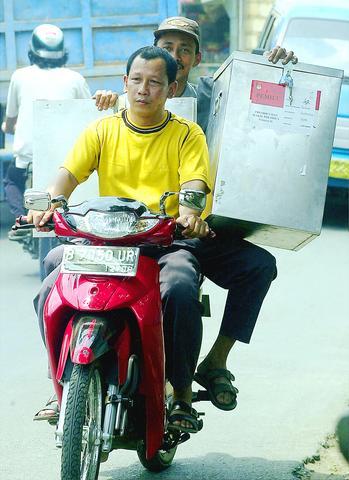Indonesians cast their ballots today in the country's first democratic presidential election. The vote will cap months of polls and finally consign decades of dictatorship to history.
In polls overshadowed by a recent terrorist bomb attack on Australia's embassy which killed nine people, incumbent Megawati Sukarnoputri will face her former security minister, Susilo Bambang Yudhoyono.

PHOTO: AP
Yudhoyono won an initial ballot on July 5 and has consistently led opinion polls which say his polished appearance and common touch has swayed support from the taciturn Megawati in a contest as much about personality as policies.
Official campaigning has been restricted to three days, during which voters were bombarded with commercials and treated to televised discussions in which the two candidates laid out their agendas.
Until the September 9 attack, security had not been a key issue in the election, dominated by concerns about corruption and economic stagnation in a nation where almost a third of the 153 million voters are jobless or underemployed.
In opening their campaigns last Tuesday, both candidates outlined policies for tackling terrorism, with Yudhoyono promising to step up intelligence work while Megawati defended her government's security record.
The embassy blast was the third terrorist attack in two years in Indonesia following the October 2002 Bali bombings in which 202 people were killed and a strike on the Jakarta Marriott hotel in August last year in which 12 died.
More than 40 people have been jailed for the Bali and Marriott attacks, blamed in the Al-Qaeda-linked Jemaah Islamiyah regional group which has also been implicated in the embassy bombing.
Observers say the recent attack is likely to boost support for former general Yudhoyono who, as Megawati's top security minister until he quit in March, headed the operation to capture and convict Bali and Marriott bombers.
Meanwhile, Megawati has engaged in a last minute publicity blitz in an effort to shake off her reticent image and is banking on support from a four-party alliance and the backing of her "little people" core voters to take her to victory.
She has considerable ground to gain after many voters deserted her Indonesian Democratic Party of Struggle in April legislative polls and the July first-round vote.
Megawati, credited with bringing economic stability to Indonesia in the wake of the 1997-1998 regional financial crisis, had enjoyed huge support among the country's poor, who saw her as a reform icon in dictator Suharto's last days.
In a final address on the eve of the elections, Megawati called for a peaceful vote.
"Let us show the world that we are a nation that can hold an election in a democratic, secure, orderly and peaceful manner," Megawati told some 2,000 people gathered outside her official residence for a prayer session.
Yudhoyono urged voters to back his bid, promising "effective leadership, hard-working leadership with vision and offering solutions."
"I appeal to you, I invite you, let us make this second round of the presidential election a success. Let us watch over this democracy of ours, let us hand everything to the people," he said.

A feud has broken out between the top leaders of the far-right Alternative for Germany (AfD) party on whether to maintain close ties with Russia. The AfD leader Alice Weidel this week slammed planned visits to Russia by some party lawmakers, while coleader Tino Chrupalla voiced a defense of Russian President Vladimir Putin. The unusual split comes at a time when mainstream politicians have accused the anti-immigration AfD of acting as stooges for the Kremlin and even spying for Russia. The row has also erupted in a year in which the AfD is flying high, often polling above the record 20 percent it

Philippine President Ferdinand Marcos Jr yesterday vowed that those behind bogus flood control projects would be arrested before Christmas, days after deadly back-to-back typhoons left swathes of the country underwater. Scores of construction firm owners, government officials and lawmakers — including Marcos’ cousin congressman — have been accused of pocketing funds for substandard or so-called “ghost” infrastructure projects. The Philippine Department of Finance has estimated the nation’s economy lost up to 118.5 billion pesos (US$2 billion) since 2023 due to corruption in flood control projects. Criminal cases against most of the people implicated are nearly complete, Marcos told reporters. “We don’t file cases for

Ecuadorans are today to vote on whether to allow the return of foreign military bases and the drafting of a new constitution that could give the country’s president more power. Voters are to decide on the presence of foreign military bases, which have been banned on Ecuadoran soil since 2008. A “yes” vote would likely bring the return of the US military to the Manta air base on the Pacific coast — once a hub for US anti-drug operations. Other questions concern ending public funding for political parties, reducing the number of lawmakers and creating an elected body that would

‘ATTACK ON CIVILIZATION’: The culture ministry released drawings of six missing statues representing the Roman goddess of Venus, the tallest of which was 40cm Investigators believe that the theft of several ancient statues dating back to the Roman era from Syria’s national museum was likely the work of an individual, not an organized gang, officials said on Wednesday. The National Museum of Damascus was closed after the heist was discovered early on Monday. The museum had reopened in January as the country recovers from a 14-year civil war and the fall of the 54-year al-Assad dynasty last year. On Wednesday, a security vehicle was parked outside the main gate of the museum in central Damascus while security guards stood nearby. People were not allowed in because